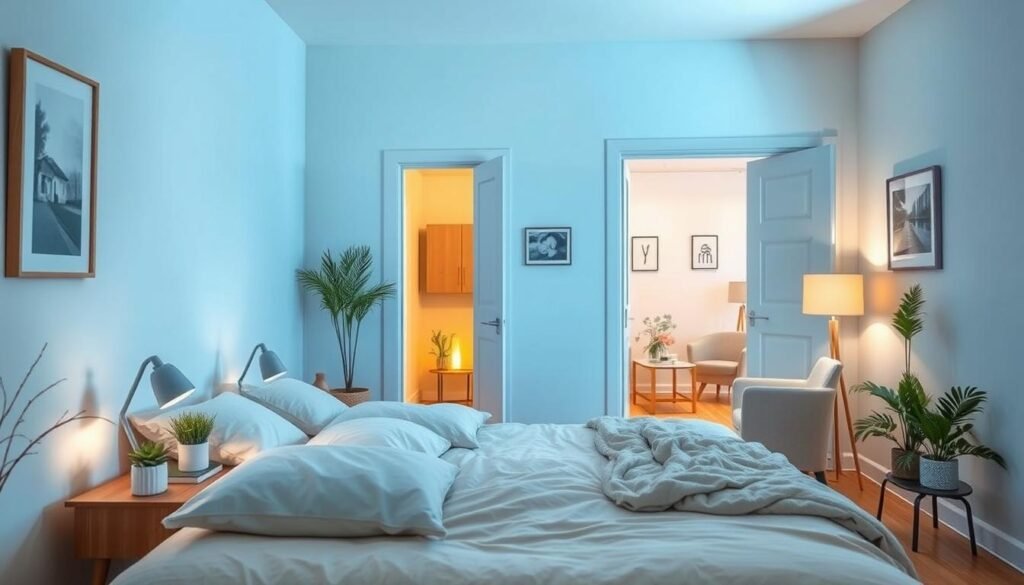Why do we struggle to sleep, the very thing we so deeply need? Many people find that insomnia and anxiety are closely linked. This connection makes sleeping well and reducing stress hard. Anxiety affects a lot of adults and causes nightly battles for sleep, despite the body’s need for rest. When trying to sleep, anxiety-filled thoughts disrupt the process, leading to many sleepless nights.
It’s crucial to understand how anxiety and insomnia are connected to break this cycle. It’s not just about trying to count sheep. Using good sleep habits and relaxation techniques can really help. Techniques like progressive muscle relaxation and deep breathing can offer relief. For tips on handling insomnia caused by anxiety, click here.
Key Takeaways
- Insomnia is a common problem for those with anxiety, impacting many people’s sleep quality.
- Good sleep hygiene, such as avoiding screens before bed, greatly improves sleep.
- Deep breathing and progressive muscle relaxation are powerful against anxiety-induced insomnia.
- Adults usually need 8 to 9 hours of sleep each night for their best health.
- It’s key to seek help for ongoing anxiety and sleeping problems.
Understanding Insomnia and Its Connection to Anxiety
Many people struggle with insomnia, especially when they have anxiety disorders. It’s hard for them to fall asleep, stay asleep, or wake up too early. Anxiety can make insomnia worse, creating a difficult loop.
Over one in three adults worldwide have insomnia signs. Those with anxiety feel the impact more. They wake up often and don’t sleep enough. This lack of sleep can make stress hormone levels go up.
Managing stress is key to fighting insomnia. Worrying about sleep can make anxiety worse. Combining treatments like cognitive behavioral therapy (CBT) helps tackle both issues. It improves sleep and reduces worry.
A regular sleep routine, avoiding caffeine and alcohol, and being active are important. These steps help improve sleep habits. They make it easier to find peace and rest at night.
What is Insomnia with Anxiety?
Insomnia with anxiety is a sleep problem caused or made worse by feeling anxious. It makes it hard to fall asleep and stay asleep all night. People with insomnia often wake up often or struggle to sleep again after waking. Stress is a big cause of sleep problems. Almost two-thirds of Americans say stress keeps them awake, as per Mental Health America.
Anxiety can show up as racing thoughts, a lot of worry, and physical issues. These problems make it tough to fall asleep naturally. Studies find that those with anxiety disorders often have trouble sleeping. About 36% of those with an anxiety disorder also have insomnia. The mix of anxiety and lack of sleep can start a bad cycle. This cycle makes both sleep and anxiety worse.
Not sleeping enough has a big effect on mental health. It can raise anxiety levels and affect depression and stress. A 2021 study showed better sleep can greatly lower anxiety and improve mental health. So, treating insomnia with anxiety helps improve sleep and mental wellness.
In the U.S., anxiety disorders are very common. Around 20% of American adults have anxiety disorders. This makes it the top mental health issue in the nation. This fact shows how key it is to understand the link between anxiety and sleep. Many people face the double challenge of insomnia and anxiety.
Symptoms of Insomnia Related to Anxiety
Many people with anxiety-related insomnia experience distressing insomnia symptoms. These include trouble falling asleep, frequent awakenings, and waking up too early. These issues stem from high levels of anxiety. Racing thoughts or intense worry often cause such problems. This makes relaxing and getting good sleep hard.
Physical symptoms like a fast heartbeat and tight muscles can make sleep even worse. This may make people feel grouchy, sad, or too anxious in the daytime. Understanding how sleep and anxiety are linked is key. Poor sleep habits can make anxiety worse, creating a tough cycle to break.
| Insomnia Symptoms | Anxiety Symptoms |
|---|---|
| Trouble falling asleep | Restlessness |
| Frequent awakenings | Racing thoughts |
| Waking up too early | Heightened worry |
| Feeling tired during the day | Feelings of tension |
| Daytime sleepiness | Increased irritability |
| Cranky or depressed mood | Difficulty concentrating |
Half of all adults might face insomnia sometime in their lives. So, solving these sleep issues is crucial for better mental health. If insomnia lasts more than three months, it can cause worse anxiety symptoms. Therefore, people should try to have better sleep habits. This can help reduce anxiety.
The Vicious Cycle of Anxiety and Sleep Deprivation
Anxiety and sleep problems are caught in a vicious cycle. Anxiety makes it hard to sleep. Then, lack of sleep makes anxiety worse. This can make someone feel more stressed and tired.
About 30% of adults in the U.S. fight with insomnia. The effects of sleep deprivation are a big part of this fight. Without enough sleep, anxiety levels can go up. It’s important for people to see how connected these issues are.
It’s key to understand how chronic stress works. It creates a loop of sleep deprivation effects, unwanted thoughts, and upset feelings. This could lead to major depression in about 20% of people. To manage anxiety and insomnia, it helps to break this bad loop.
Seeking expert help and using techniques like Cognitive Behavioral Therapy (CBT) are good solutions. These methods focus on both anxiety and sleep troubles. They help create better sleep habits, which then help with anxiety.

Importance of Sleep Hygiene for Better Sleep
Sleep hygiene involves habits for better sleep and wellness. Adopting good sleep habits improves restfulness and energy. Research shows sleep hygiene is a key part of tackling sleep issues.
Signs of bad sleep hygiene include trouble sleeping and daytime tiredness. Loud snoring and waking up gasping might indicate sleep problems. It’s crucial to stick to a regular sleep schedule to fix these issues.
Getting sunlight helps regulate sleep patterns. Cutting down caffeine and alcohol is also important. Avoiding nicotine and staying active improves sleep by supporting the body’s sleep cycle.
A proper sleep environment is essential for good rest. A dark, quiet, and comfy room helps. Using calming scents and choosing the right mattress also make a big difference.
| Age Group | Recommended Sleep Hours |
|---|---|
| Newborns (0–3 months) | 14–17 hours |
| Infants (4–12 months) | 12–16 hours |
| Toddlers (1–2 years) | 11–14 hours |
| Preschoolers (3–5 years) | 10–13 hours |
| School-age children (6–12 years) | 9–12 hours |
| Teenagers (13–17 years) | 8–10 hours |
| Adults (18–60 years) | 7+ hours |
| Adults (61–64 years) | 7–9 hours |
| Seniors (65+ years) | 7–8 hours |
Effective Relaxation Techniques for Sleep Improvement
Trying out relaxation methods can really help those who can’t sleep due to stress. These strategies soothe your mind and body. This tackles the stress that keeps you awake at night.
Deep Breathing Exercises
Deep breathing is a strong way to fight off anxiety. It helps you start feeling calm by triggering your body’s relaxation mode. Studies show that just ten deep breaths can make your breathing slower and help you relax.
Using your diaphragm to breathe, like in diaphragmatic breathing, makes breathing more effective and lowers stress. The 4-7-8 technique is another easy way to chill before bedtime. You breathe in for 4 seconds, hold it for 7, then breathe out for 8.
Progressive Muscle Relaxation
Progressive muscle relaxation works well too. It’s about tensing and then relaxing different muscles in your body. This can really help with the physical signs of anxiety. Letting go of muscle tension makes you feel more relaxed and sleep better.
Doing these relaxation practices for about 20 to 25 minutes each day for two weeks can really improve your sleep. You’ll find it easier to drift off and stay asleep.
| Relaxation Technique | Benefits | Recommended Duration |
|---|---|---|
| Deep Breathing | Activates relaxation response, reduces stress | 10 breaths or more as needed |
| Progressive Muscle Relaxation | Alleviates physical tension, promotes relaxation | 20-25 minutes daily |
| Yoga Nidra | Induces calmness, potential sleep improvement | 20-30 minutes as needed |
| Body Scans | Focus on tension release, fosters relaxation | 15-20 minutes |
Adding these easy-to-do relaxation techniques to your day can really help your sleep get better. As you try different strategies, having a calm place to sleep helps too. This makes it even easier to get a good night’s sleep.
Managing Stress with Cognitive Behavioral Therapy (CBT)
Cognitive Behavioral Therapy (CBT) is a top method for dealing with insomnia caused by anxiety. It aims to shift the thoughts that disturb sleep. Through its techniques, CBT helps people fight their insomnia by adding stress management into their daily lives.
Understanding CBT Methods
CBT stands out for its lasting results in treating insomnia. It gets to the root of the problem, not just the symptoms. The main techniques include:
- Routine alteration: Changing sleep schedules and habits to get better sleep.
- Sleep restriction: Cutting down time in bed to increase sleep desire.
- Stimulus control: Making the bedroom a place for sleep only to avoid bad associations.
- Relaxation techniques: Using deep breathing and muscle relaxation to relax before bedtime.
Tracking Sleep Patterns: The Sleep Diary
Keeping a sleep diary is vital in CBT. It helps users track their sleep and spot trouble spots. With a diary, you can see:
- How long it takes to fall asleep and how often you wake up at night.
- Which daily activities or stresses affect your sleep.
- The link between sleep quality, mood, and energy.
Using a sleep diary with stress control methods offers insights into insomnia. It helps with making the right lifestyle shifts for better sleep.
Considerations for Melatonin Supplements
Many people with insomnia find melatonin supplements helpful. Melatonin regulates our sleep-wake cycle. It’s a top choice for those seeking alternative insomnia treatments. Researchers have found that melatonin can lower anxiety around surgery. This shows its broad benefits, not just for sleep.
Start with a small dose of melatonin if you’re considering it. The recommended amount is 0.1 to 10 milligrams. Take it 1 to 2 hours before going to bed to sleep better. It’s important to see how your body reacts, as everyone is different.
Melatonin is available in various forms, like pills, patches, and suppositories. This gives people options based on their needs and preferences. Always talk to a doctor before starting melatonin. This is vital if you have other health issues or treatments, as anxiety can come from many sources.

The interest in melatonin is growing as more people focus on mental health. Before using melatonin, be sure to understand your options. It can be a smart addition to your sleep routine.
Lifestyle Changes to Combat Insomnia with Anxiety
Making lifestyle changes is crucial for beating insomnia caused by anxiety. Eating well and having good sleep habits can greatly improve your sleep. Regular exercise helps reduce anxiety and makes sleep better by promoting restful patterns.
Nutrition and Sleep Quality
The link between what you eat and how you sleep is strong. Eating a balanced diet and avoiding caffeine and heavy meals before sleep can make a big difference. Good nutrition and sleep habits help you fall asleep faster and sleep more deeply.
Regular Physical Activity
Exercise can help with insomnia in many ways. People who work out for at least 150 minutes a week have fewer insomnia symptoms and less anxiety. Being active lowers stress and leads to better sleep, making you feel more rested.
| Lifestyle Change | Impact on Sleep | Additional Benefits |
|---|---|---|
| Maintaining a Sleep Schedule | Enhances sleep consistency | Boosts daytime alertness |
| Avoiding Caffeine and Alcohol | Reduces sleep disturbances | Lowers anxiety levels |
| Regular Exercise | Improves insomnia symptoms | Alleviates stress and depression |
| Creating a Relaxing Bedtime Ritual | Facilitates easier sleep onset | Enhances relaxation |
When to Seek Professional Help for Sleep Issues
Knowing when to get help for sleep problems is crucial for your health. Issues like insomnia can mess with your day and hurt your mental health. Symptoms include trouble getting to sleep, not staying asleep, or waking up too early.
If these problems happen often, like more than three times a week for three months, talk to a doctor. The National Sleep Foundation says sleeping well means spending 85% of bed time asleep and dozing off in 30 minutes.
It’s important to know the signs of sleep issues. There are over 100 types, including insomnia, sleep apnea, and narcolepsy. These can lead to mood issues, depression, and even serious problems like heart disease and diabetes. If your sleep isn’t right, getting help is key.

A sleep diary can help spot patterns and check sleep quality. Doctors might need to run sleep tests to find out what’s wrong. If sleep doesn’t get better with lifestyle changes, you may need expert advice.
Get emergency help if pain gets worse suddenly, breathing is hard at night, or if mental health drops quickly. Not dealing with sleep issues can have big bad effects. Taking action early is best if sleep quality goes down.
For more info on when to get help for sleep problems, check this resource.
Conclusion
Overcoming insomnia with anxiety is a common challenge. It’s important to know how anxiety affects sleep. This knowledge is the first step to sleep better.
Finding out how anxiety leads to sleep problems is key. Anxiety can make it hard to sleep, making everything worse. Learning about sleep habits and ways to calm down can help a lot.
Trying relaxation methods like deep breathing can help you sleep better. Changing what you eat and exercising more are also good. If sleep problems don’t go away, it’s important to get professional help.
With the right self-care and advice, peace can take the place of sleepless nights. Being proactive about insomnia and anxiety can change your life. It shows that good sleep is within reach and very important.